Balancing Environmental Protection and Shipping Economics: A Report
VerifiedAdded on 2022/08/24
|12
|1304
|34
Report
AI Summary
This report delves into the critical issue of sustainability within the shipping industry, exploring the negative environmental impacts of human activities with a particular focus on shipping. It aims to identify methods for balancing environmental protection with economic sustainability, analyzing the benefits of environmental protection measures for shipping companies while also addressing the challenges they face. The research employs a qualitative methodology, including interviews with shipping industry managers and analysis of secondary data, to understand perspectives on sustainability, emissions, and regulatory compliance. The findings highlight key concerns like minimizing carbon emissions, addressing greenhouse gases, and the difficulties in achieving optimal sustainable supply chains. The report also discusses the limitations of current policies and management tools, the need for education, and the role of technological transfer in promoting environmental safety. It concludes with recommendations for balancing economic and environmental considerations, emphasizing the importance of reducing poverty and ecosystem destruction, promoting public participation, and adopting realistic operational strategies for long-term growth in the shipping sector. The report underscores the need for further research and investigation to achieve higher environmental performance and create a balanced approach for the shipping industry.
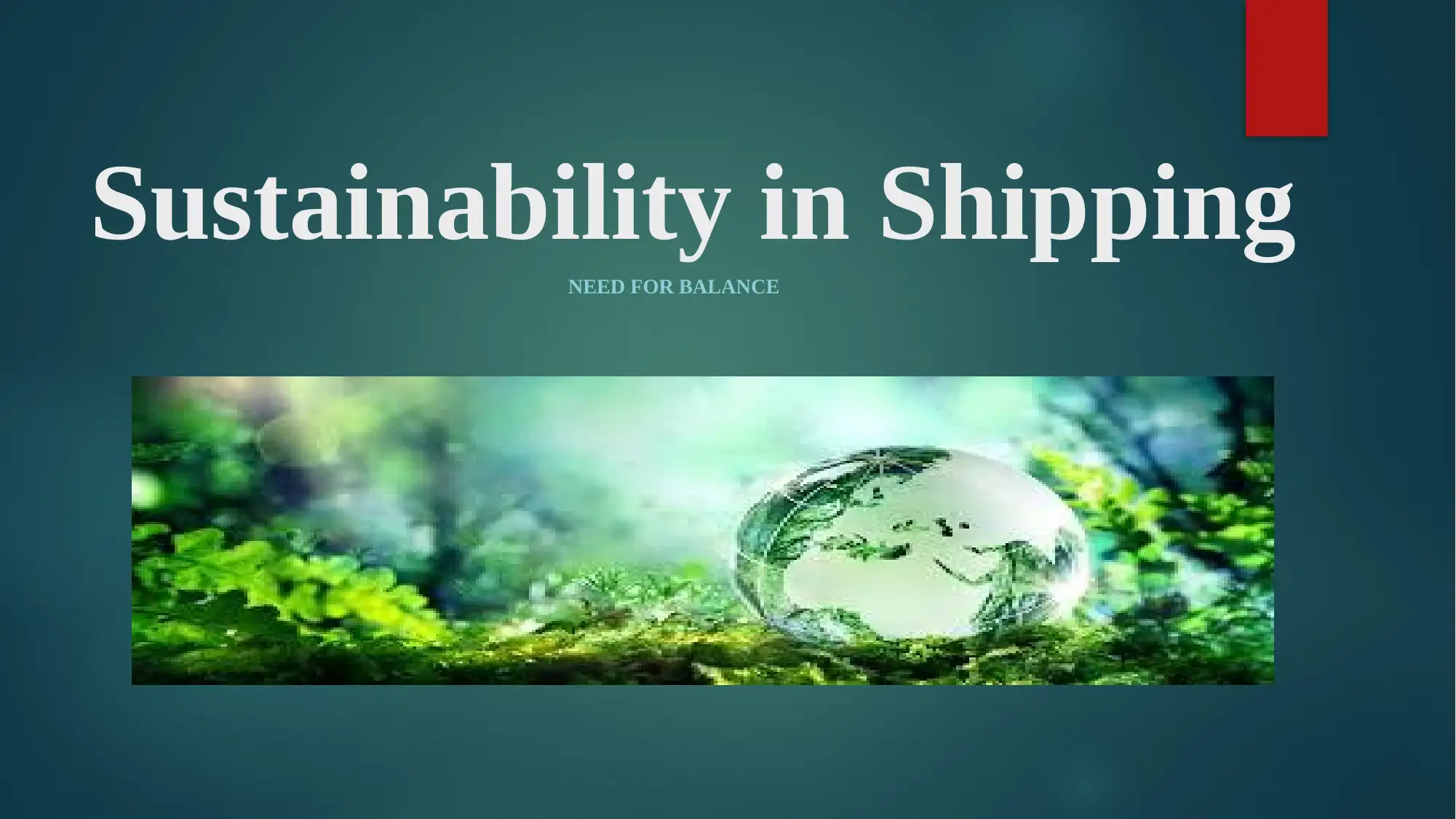
Sustainability in ShippingNEED FOR BALANCE
Paraphrase This Document
Need a fresh take? Get an instant paraphrase of this document with our AI Paraphraser
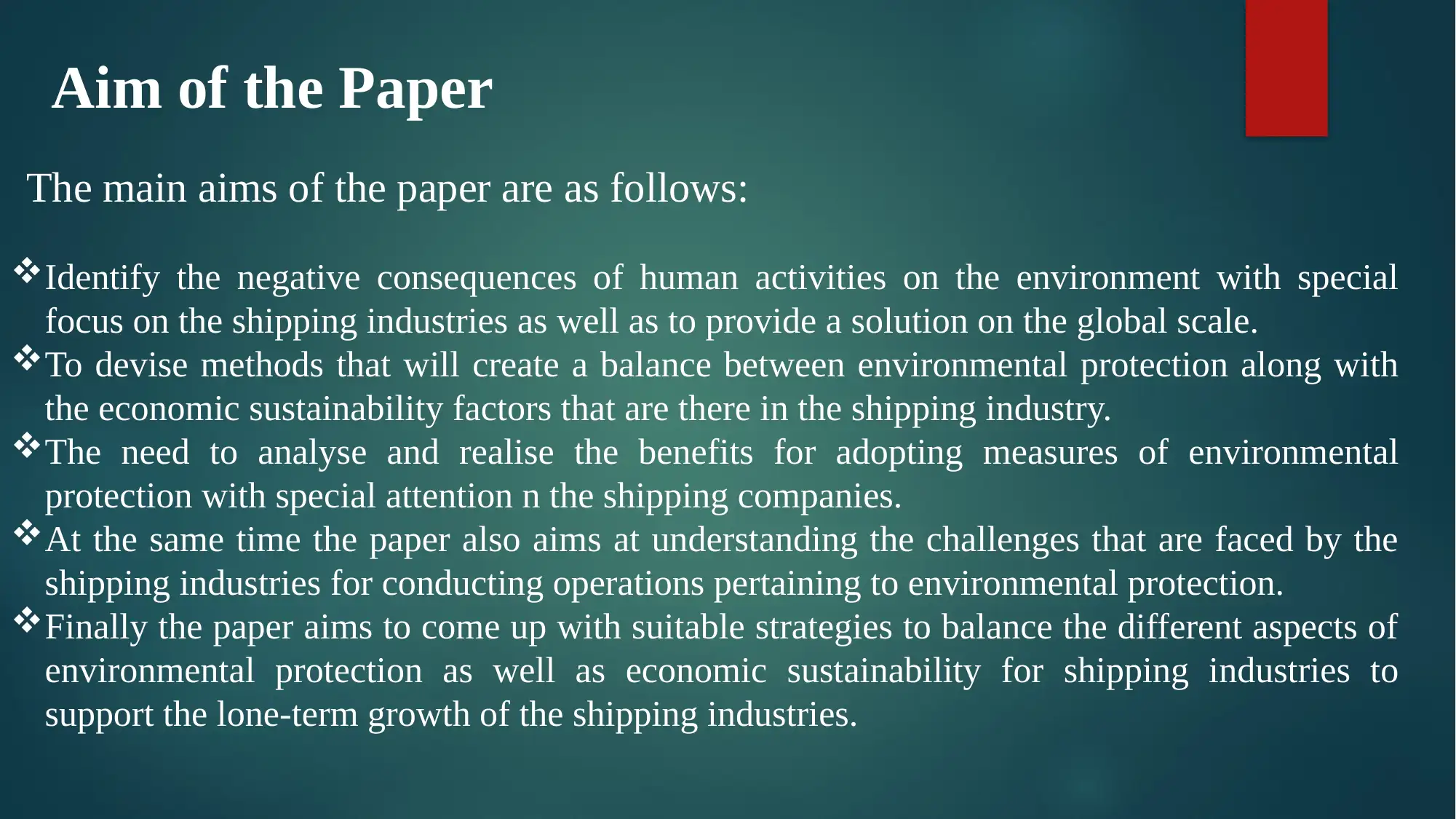
Aim of the Paper
The main aims of the paper are as follows:
Identify the negative consequences of human activities on the environment with special
focus on the shipping industries as well as to provide a solution on the global scale.
To devise methods that will create a balance between environmental protection along with
the economic sustainability factors that are there in the shipping industry.
The need to analyse and realise the benefits for adopting measures of environmental
protection with special attention n the shipping companies.
At the same time the paper also aims at understanding the challenges that are faced by the
shipping industries for conducting operations pertaining to environmental protection.
Finally the paper aims to come up with suitable strategies to balance the different aspects of
environmental protection as well as economic sustainability for shipping industries to
support the lone-term growth of the shipping industries.
The main aims of the paper are as follows:
Identify the negative consequences of human activities on the environment with special
focus on the shipping industries as well as to provide a solution on the global scale.
To devise methods that will create a balance between environmental protection along with
the economic sustainability factors that are there in the shipping industry.
The need to analyse and realise the benefits for adopting measures of environmental
protection with special attention n the shipping companies.
At the same time the paper also aims at understanding the challenges that are faced by the
shipping industries for conducting operations pertaining to environmental protection.
Finally the paper aims to come up with suitable strategies to balance the different aspects of
environmental protection as well as economic sustainability for shipping industries to
support the lone-term growth of the shipping industries.
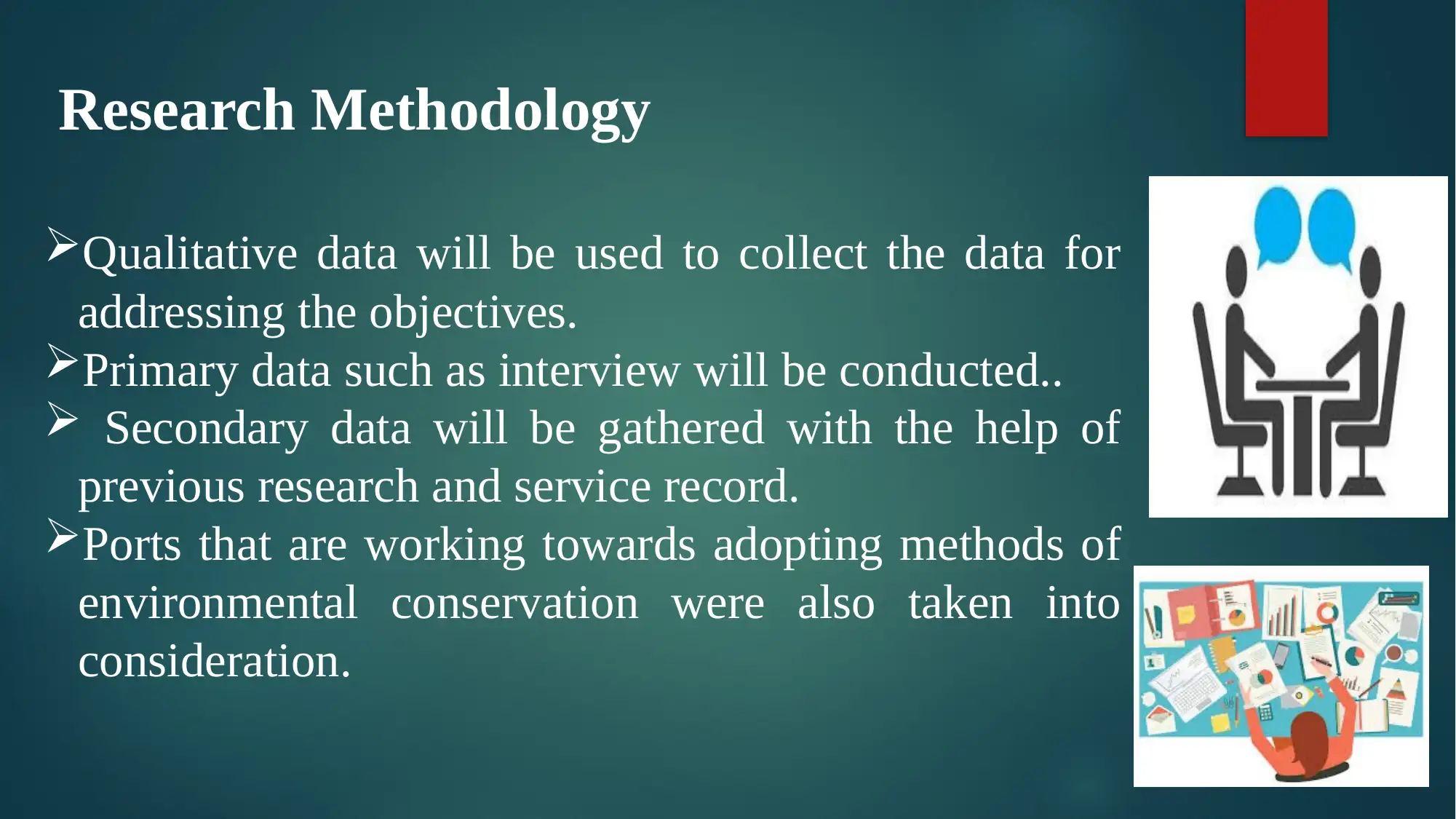
Research Methodology
Qualitative data will be used to collect the data for
addressing the objectives.
Primary data such as interview will be conducted..
Secondary data will be gathered with the help of
previous research and service record.
Ports that are working towards adopting methods of
environmental conservation were also taken into
consideration.
Qualitative data will be used to collect the data for
addressing the objectives.
Primary data such as interview will be conducted..
Secondary data will be gathered with the help of
previous research and service record.
Ports that are working towards adopting methods of
environmental conservation were also taken into
consideration.
⊘ This is a preview!⊘
Do you want full access?
Subscribe today to unlock all pages.

Trusted by 1+ million students worldwide
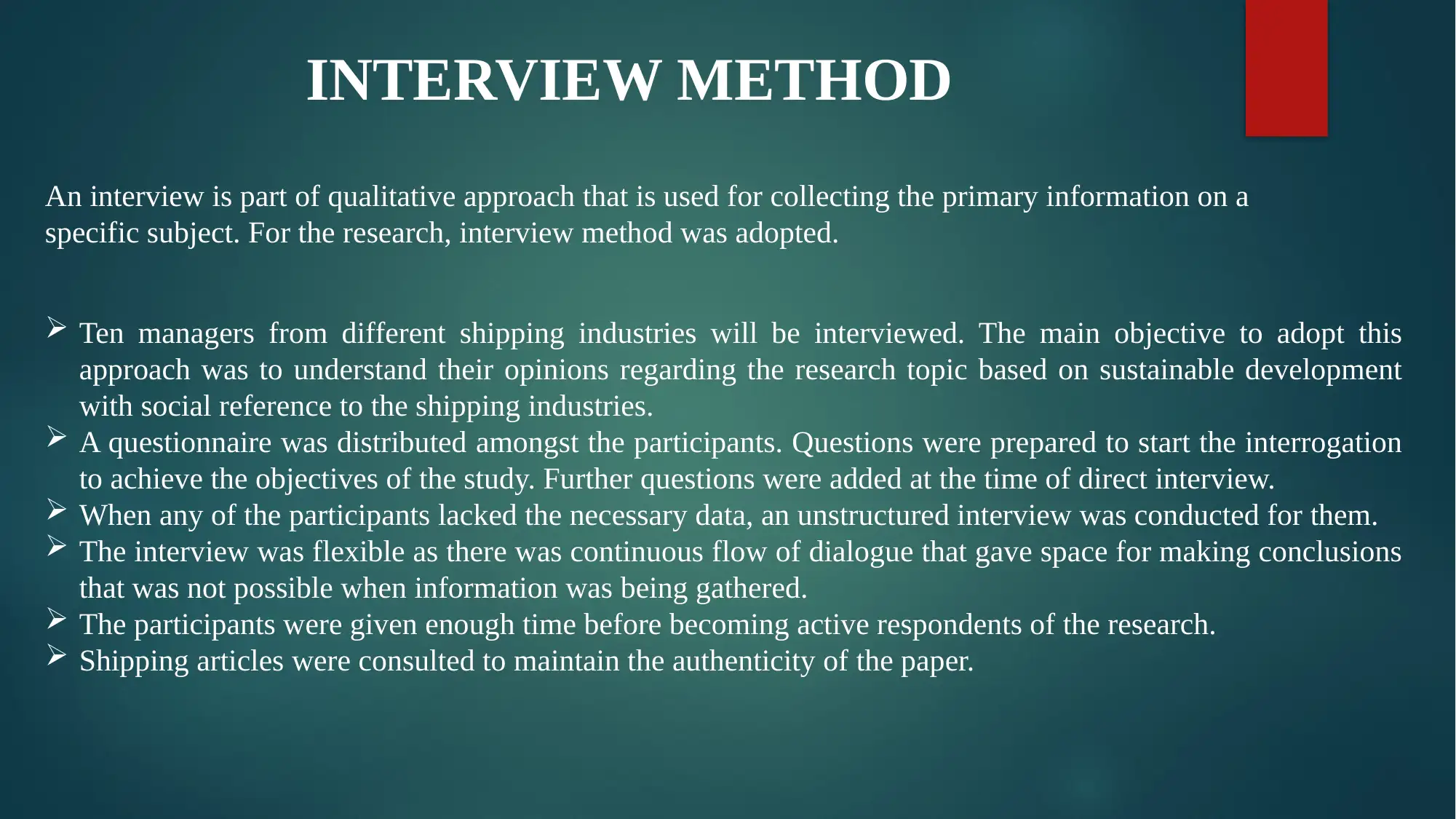
INTERVIEW METHOD
An interview is part of qualitative approach that is used for collecting the primary information on a
specific subject. For the research, interview method was adopted.
Ten managers from different shipping industries will be interviewed. The main objective to adopt this
approach was to understand their opinions regarding the research topic based on sustainable development
with social reference to the shipping industries.
A questionnaire was distributed amongst the participants. Questions were prepared to start the interrogation
to achieve the objectives of the study. Further questions were added at the time of direct interview.
When any of the participants lacked the necessary data, an unstructured interview was conducted for them.
The interview was flexible as there was continuous flow of dialogue that gave space for making conclusions
that was not possible when information was being gathered.
The participants were given enough time before becoming active respondents of the research.
Shipping articles were consulted to maintain the authenticity of the paper.
An interview is part of qualitative approach that is used for collecting the primary information on a
specific subject. For the research, interview method was adopted.
Ten managers from different shipping industries will be interviewed. The main objective to adopt this
approach was to understand their opinions regarding the research topic based on sustainable development
with social reference to the shipping industries.
A questionnaire was distributed amongst the participants. Questions were prepared to start the interrogation
to achieve the objectives of the study. Further questions were added at the time of direct interview.
When any of the participants lacked the necessary data, an unstructured interview was conducted for them.
The interview was flexible as there was continuous flow of dialogue that gave space for making conclusions
that was not possible when information was being gathered.
The participants were given enough time before becoming active respondents of the research.
Shipping articles were consulted to maintain the authenticity of the paper.
Paraphrase This Document
Need a fresh take? Get an instant paraphrase of this document with our AI Paraphraser
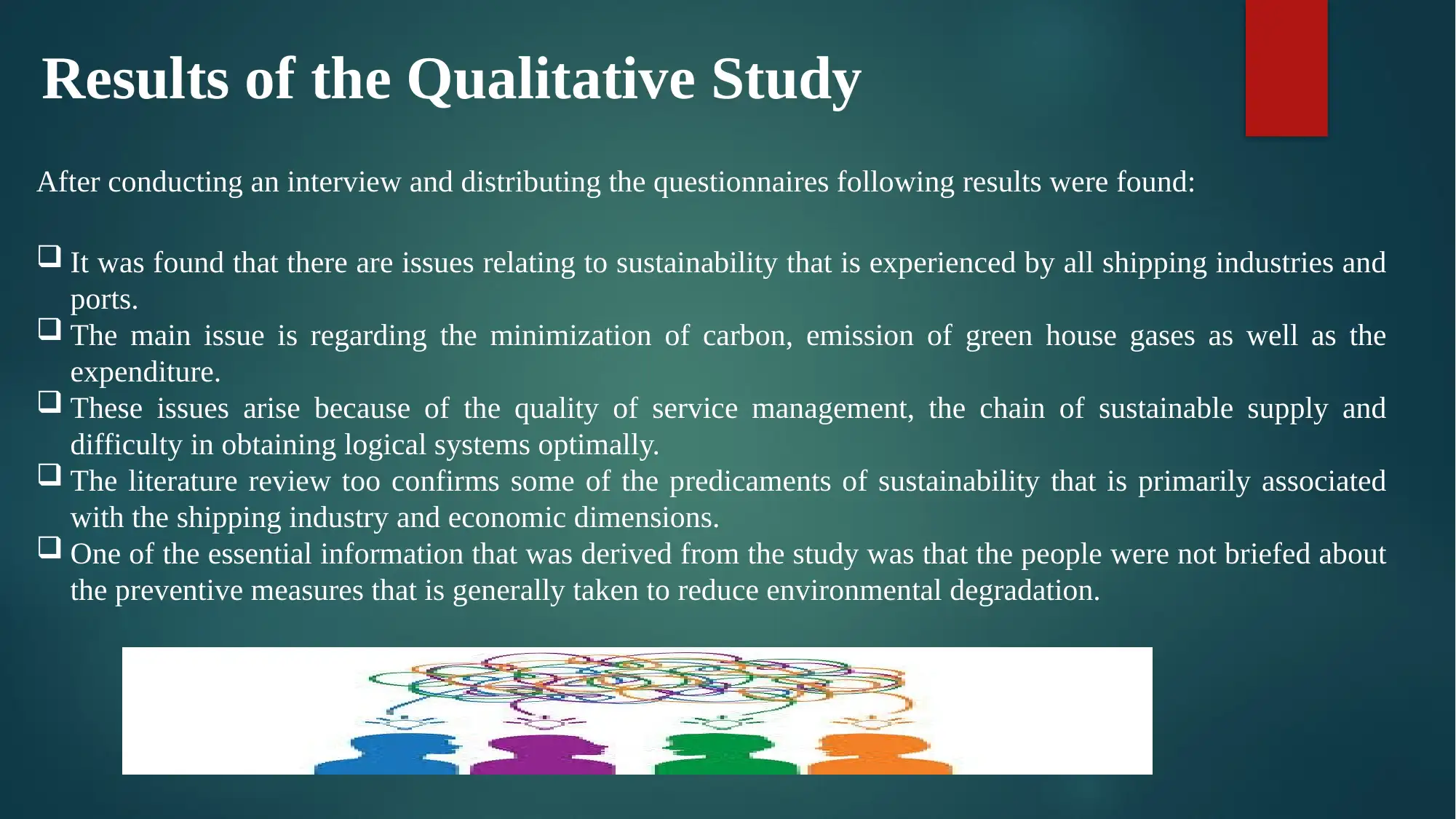
Results of the Qualitative Study
After conducting an interview and distributing the questionnaires following results were found:
It was found that there are issues relating to sustainability that is experienced by all shipping industries and
ports.
The main issue is regarding the minimization of carbon, emission of green house gases as well as the
expenditure.
These issues arise because of the quality of service management, the chain of sustainable supply and
difficulty in obtaining logical systems optimally.
The literature review too confirms some of the predicaments of sustainability that is primarily associated
with the shipping industry and economic dimensions.
One of the essential information that was derived from the study was that the people were not briefed about
the preventive measures that is generally taken to reduce environmental degradation.
After conducting an interview and distributing the questionnaires following results were found:
It was found that there are issues relating to sustainability that is experienced by all shipping industries and
ports.
The main issue is regarding the minimization of carbon, emission of green house gases as well as the
expenditure.
These issues arise because of the quality of service management, the chain of sustainable supply and
difficulty in obtaining logical systems optimally.
The literature review too confirms some of the predicaments of sustainability that is primarily associated
with the shipping industry and economic dimensions.
One of the essential information that was derived from the study was that the people were not briefed about
the preventive measures that is generally taken to reduce environmental degradation.
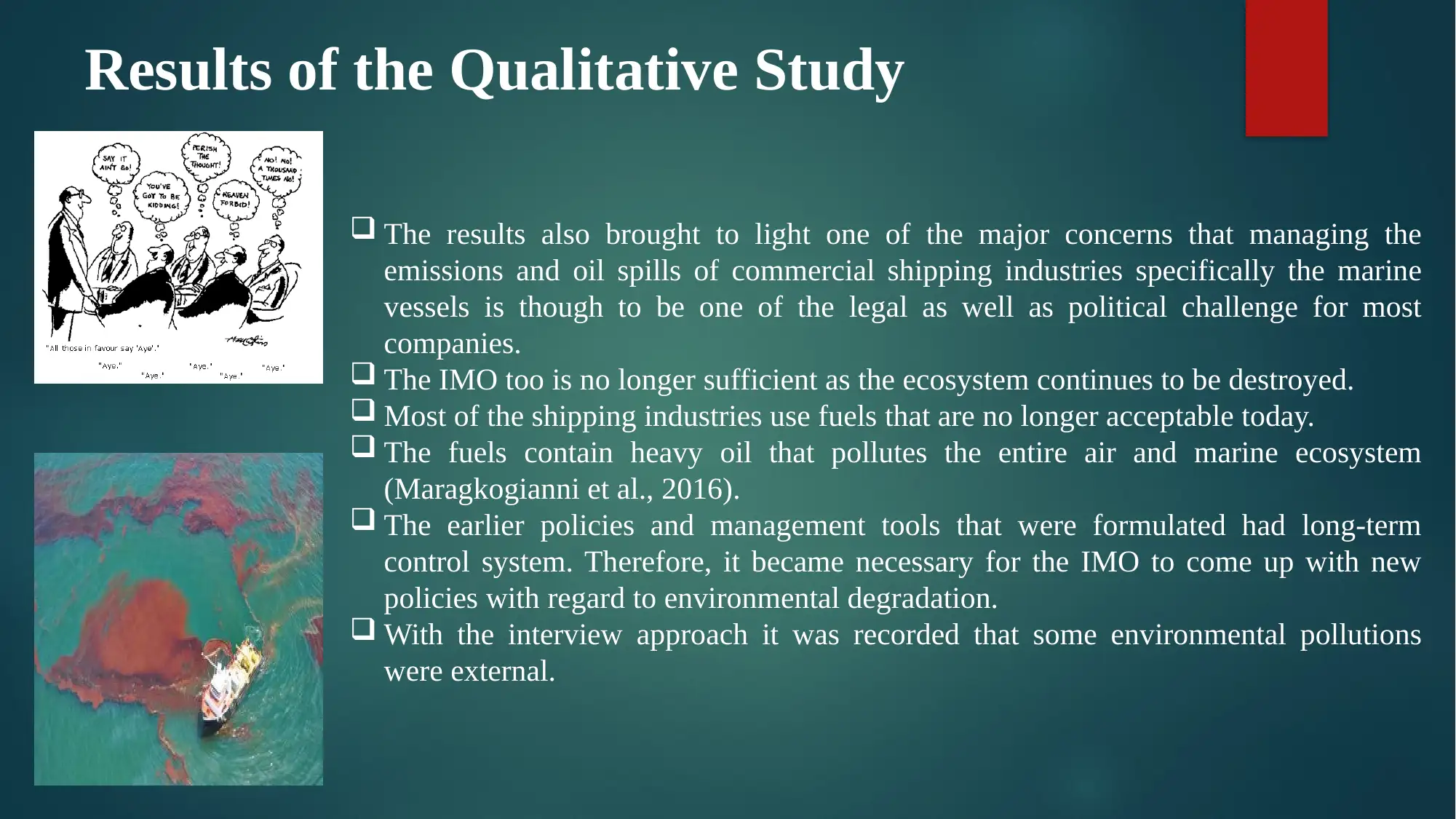
Results of the Qualitative Study
The results also brought to light one of the major concerns that managing the
emissions and oil spills of commercial shipping industries specifically the marine
vessels is though to be one of the legal as well as political challenge for most
companies.
The IMO too is no longer sufficient as the ecosystem continues to be destroyed.
Most of the shipping industries use fuels that are no longer acceptable today.
The fuels contain heavy oil that pollutes the entire air and marine ecosystem
(Maragkogianni et al., 2016).
The earlier policies and management tools that were formulated had long-term
control system. Therefore, it became necessary for the IMO to come up with new
policies with regard to environmental degradation.
With the interview approach it was recorded that some environmental pollutions
were external.
The results also brought to light one of the major concerns that managing the
emissions and oil spills of commercial shipping industries specifically the marine
vessels is though to be one of the legal as well as political challenge for most
companies.
The IMO too is no longer sufficient as the ecosystem continues to be destroyed.
Most of the shipping industries use fuels that are no longer acceptable today.
The fuels contain heavy oil that pollutes the entire air and marine ecosystem
(Maragkogianni et al., 2016).
The earlier policies and management tools that were formulated had long-term
control system. Therefore, it became necessary for the IMO to come up with new
policies with regard to environmental degradation.
With the interview approach it was recorded that some environmental pollutions
were external.
⊘ This is a preview!⊘
Do you want full access?
Subscribe today to unlock all pages.

Trusted by 1+ million students worldwide
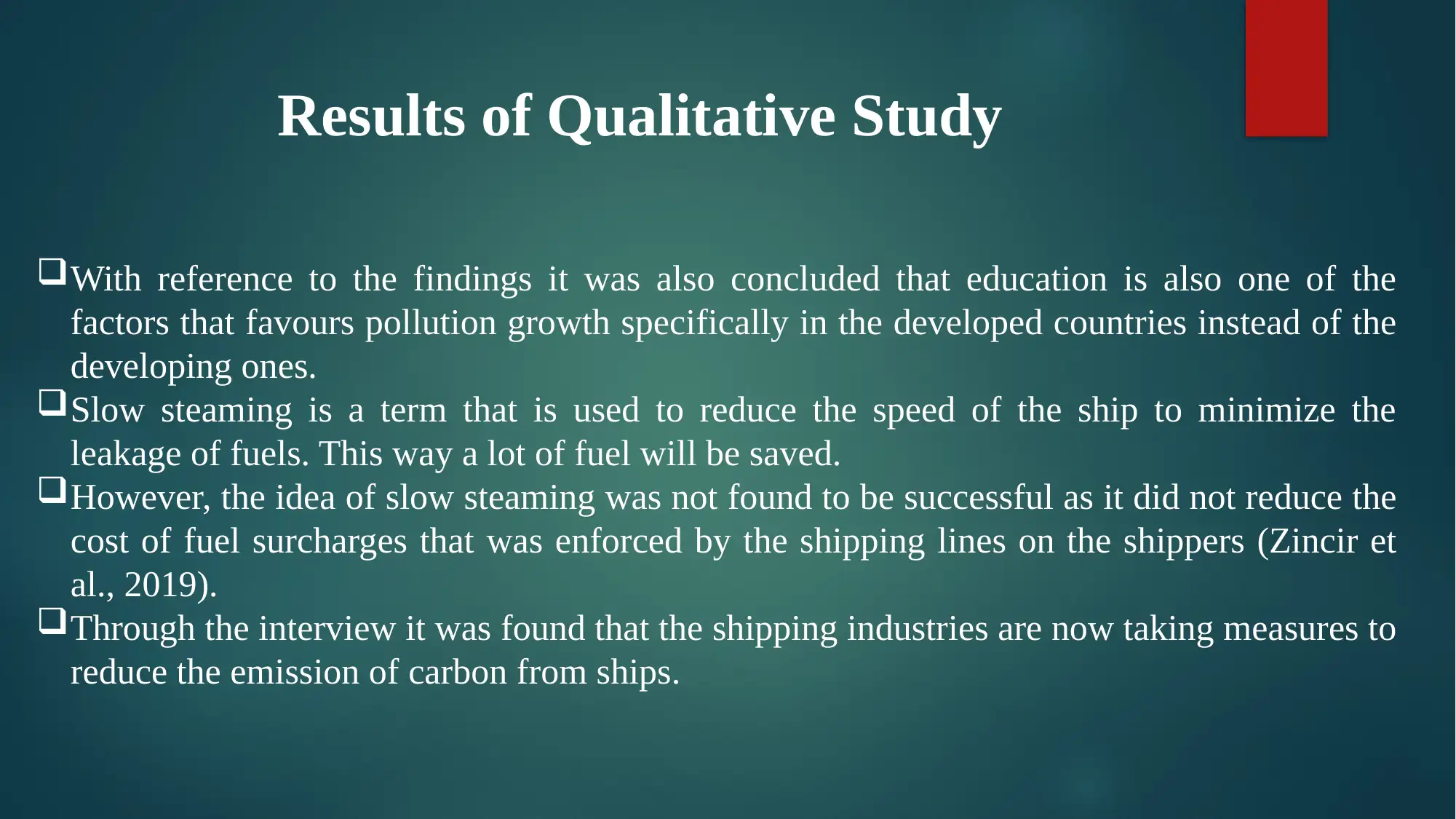
Results of Qualitative Study
With reference to the findings it was also concluded that education is also one of the
factors that favours pollution growth specifically in the developed countries instead of the
developing ones.
Slow steaming is a term that is used to reduce the speed of the ship to minimize the
leakage of fuels. This way a lot of fuel will be saved.
However, the idea of slow steaming was not found to be successful as it did not reduce the
cost of fuel surcharges that was enforced by the shipping lines on the shippers (Zincir et
al., 2019).
Through the interview it was found that the shipping industries are now taking measures to
reduce the emission of carbon from ships.
With reference to the findings it was also concluded that education is also one of the
factors that favours pollution growth specifically in the developed countries instead of the
developing ones.
Slow steaming is a term that is used to reduce the speed of the ship to minimize the
leakage of fuels. This way a lot of fuel will be saved.
However, the idea of slow steaming was not found to be successful as it did not reduce the
cost of fuel surcharges that was enforced by the shipping lines on the shippers (Zincir et
al., 2019).
Through the interview it was found that the shipping industries are now taking measures to
reduce the emission of carbon from ships.
Paraphrase This Document
Need a fresh take? Get an instant paraphrase of this document with our AI Paraphraser
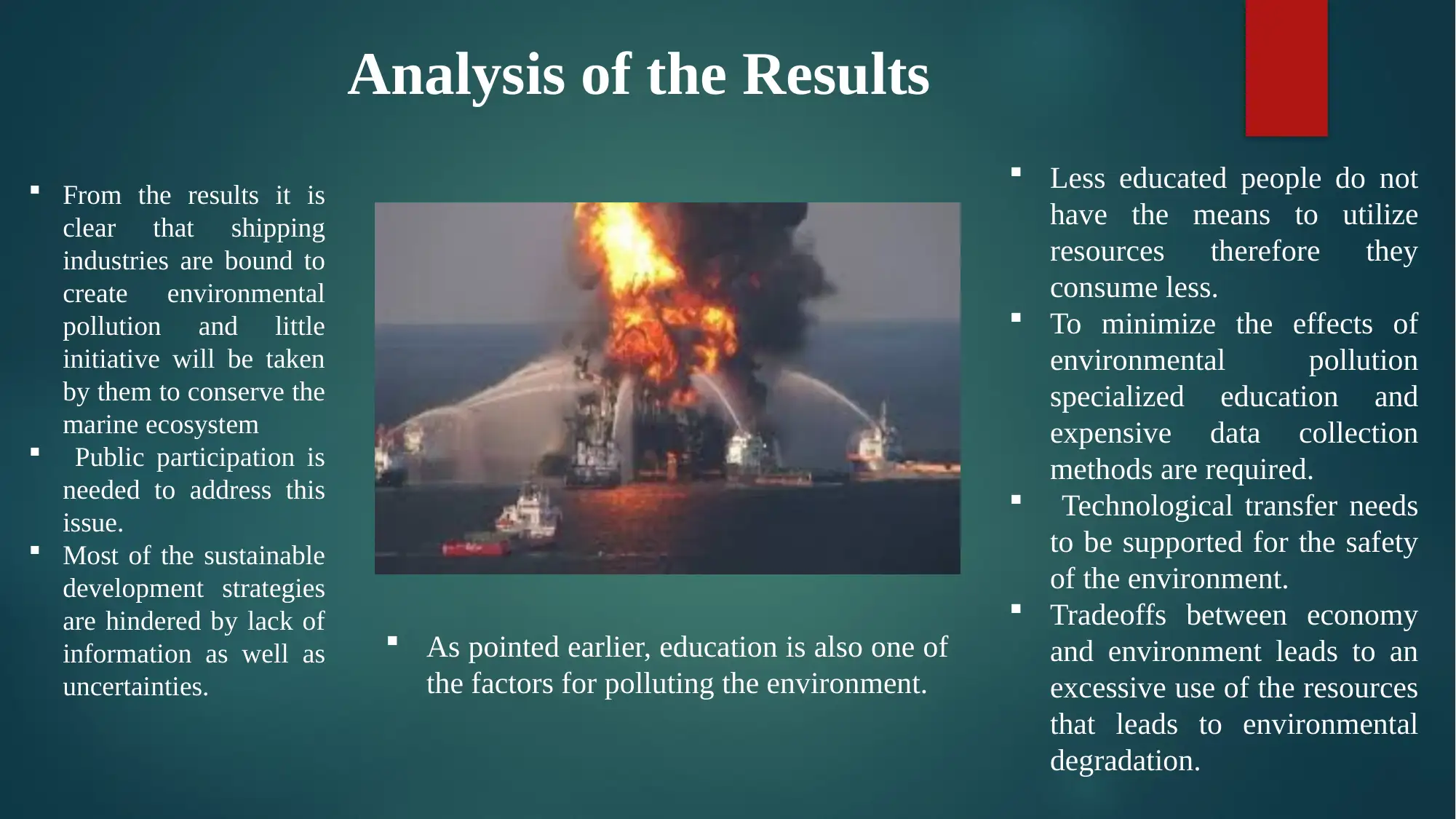
Analysis of the Results
From the results it is
clear that shipping
industries are bound to
create environmental
pollution and little
initiative will be taken
by them to conserve the
marine ecosystem
Public participation is
needed to address this
issue.
Most of the sustainable
development strategies
are hindered by lack of
information as well as
uncertainties.
As pointed earlier, education is also one of
the factors for polluting the environment.
Less educated people do not
have the means to utilize
resources therefore they
consume less.
To minimize the effects of
environmental pollution
specialized education and
expensive data collection
methods are required.
Technological transfer needs
to be supported for the safety
of the environment.
Tradeoffs between economy
and environment leads to an
excessive use of the resources
that leads to environmental
degradation.
From the results it is
clear that shipping
industries are bound to
create environmental
pollution and little
initiative will be taken
by them to conserve the
marine ecosystem
Public participation is
needed to address this
issue.
Most of the sustainable
development strategies
are hindered by lack of
information as well as
uncertainties.
As pointed earlier, education is also one of
the factors for polluting the environment.
Less educated people do not
have the means to utilize
resources therefore they
consume less.
To minimize the effects of
environmental pollution
specialized education and
expensive data collection
methods are required.
Technological transfer needs
to be supported for the safety
of the environment.
Tradeoffs between economy
and environment leads to an
excessive use of the resources
that leads to environmental
degradation.
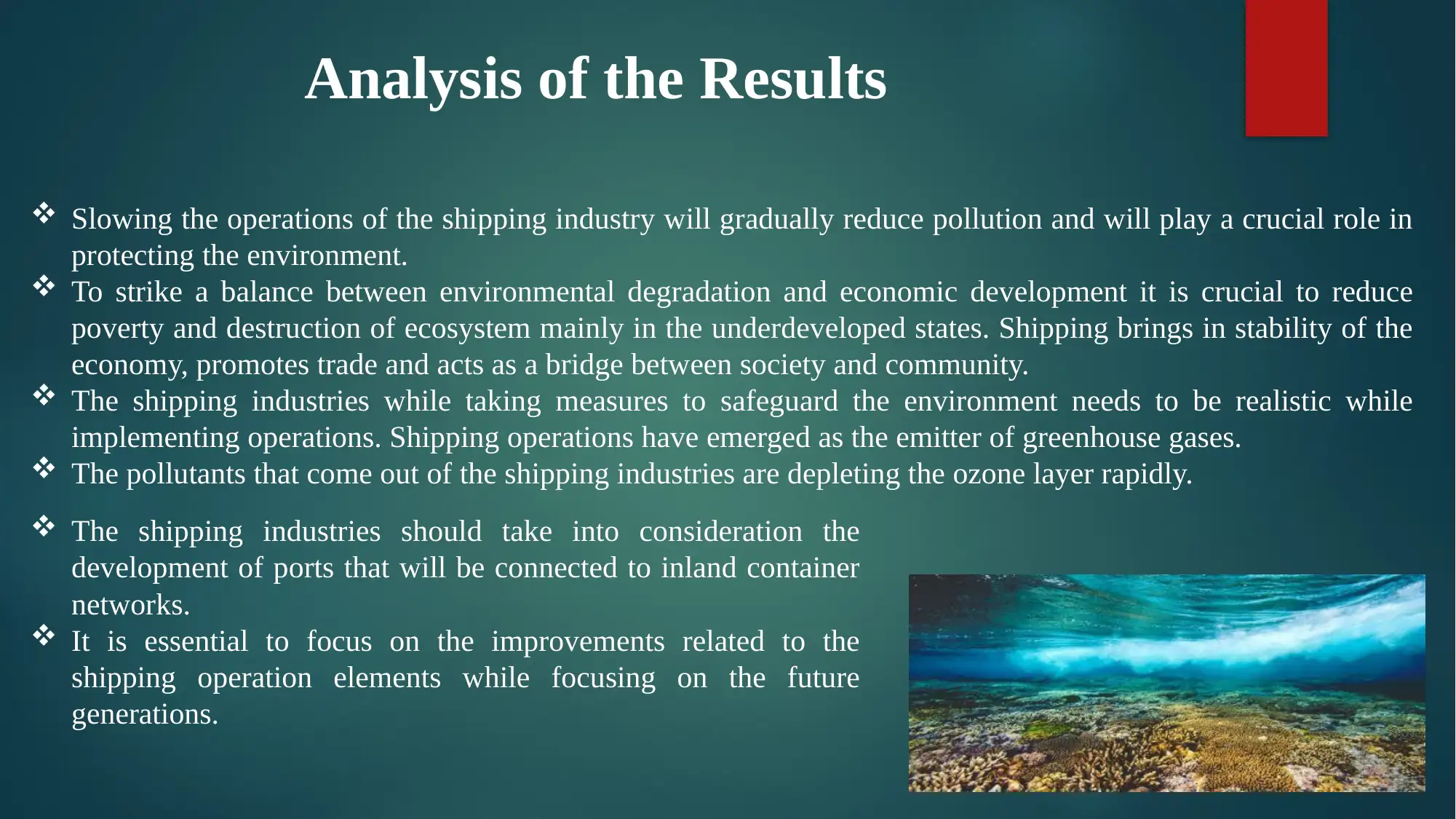
Analysis of the Results
Slowing the operations of the shipping industry will gradually reduce pollution and will play a crucial role in
protecting the environment.
To strike a balance between environmental degradation and economic development it is crucial to reduce
poverty and destruction of ecosystem mainly in the underdeveloped states. Shipping brings in stability of the
economy, promotes trade and acts as a bridge between society and community.
The shipping industries while taking measures to safeguard the environment needs to be realistic while
implementing operations. Shipping operations have emerged as the emitter of greenhouse gases.
The pollutants that come out of the shipping industries are depleting the ozone layer rapidly.
The shipping industries should take into consideration the
development of ports that will be connected to inland container
networks.
It is essential to focus on the improvements related to the
shipping operation elements while focusing on the future
generations.
Slowing the operations of the shipping industry will gradually reduce pollution and will play a crucial role in
protecting the environment.
To strike a balance between environmental degradation and economic development it is crucial to reduce
poverty and destruction of ecosystem mainly in the underdeveloped states. Shipping brings in stability of the
economy, promotes trade and acts as a bridge between society and community.
The shipping industries while taking measures to safeguard the environment needs to be realistic while
implementing operations. Shipping operations have emerged as the emitter of greenhouse gases.
The pollutants that come out of the shipping industries are depleting the ozone layer rapidly.
The shipping industries should take into consideration the
development of ports that will be connected to inland container
networks.
It is essential to focus on the improvements related to the
shipping operation elements while focusing on the future
generations.
⊘ This is a preview!⊘
Do you want full access?
Subscribe today to unlock all pages.

Trusted by 1+ million students worldwide
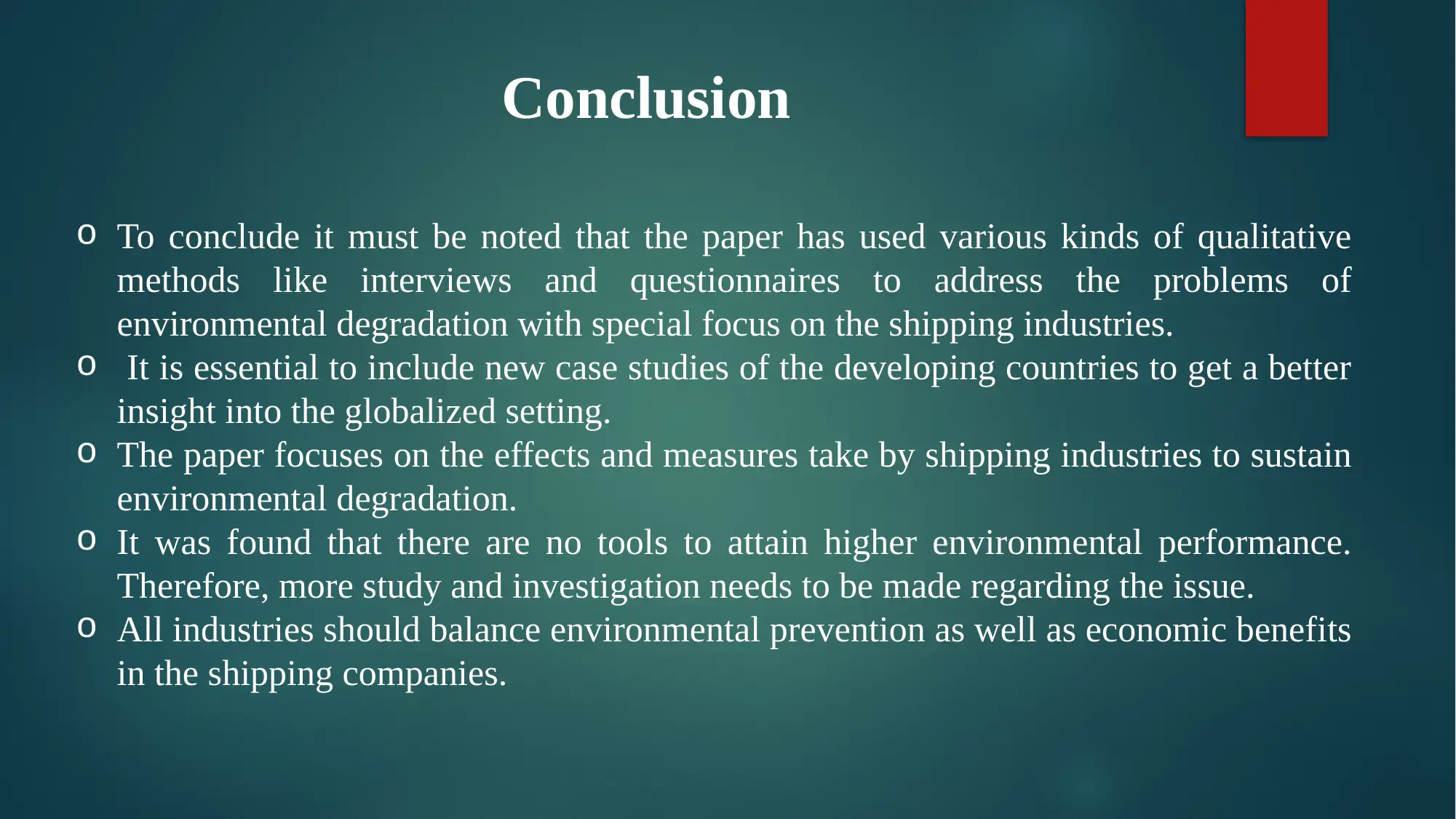
Conclusion
o To conclude it must be noted that the paper has used various kinds of qualitative
methods like interviews and questionnaires to address the problems of
environmental degradation with special focus on the shipping industries.
o It is essential to include new case studies of the developing countries to get a better
insight into the globalized setting.
o The paper focuses on the effects and measures take by shipping industries to sustain
environmental degradation.
o It was found that there are no tools to attain higher environmental performance.
Therefore, more study and investigation needs to be made regarding the issue.
o All industries should balance environmental prevention as well as economic benefits
in the shipping companies.
o To conclude it must be noted that the paper has used various kinds of qualitative
methods like interviews and questionnaires to address the problems of
environmental degradation with special focus on the shipping industries.
o It is essential to include new case studies of the developing countries to get a better
insight into the globalized setting.
o The paper focuses on the effects and measures take by shipping industries to sustain
environmental degradation.
o It was found that there are no tools to attain higher environmental performance.
Therefore, more study and investigation needs to be made regarding the issue.
o All industries should balance environmental prevention as well as economic benefits
in the shipping companies.
Paraphrase This Document
Need a fresh take? Get an instant paraphrase of this document with our AI Paraphraser
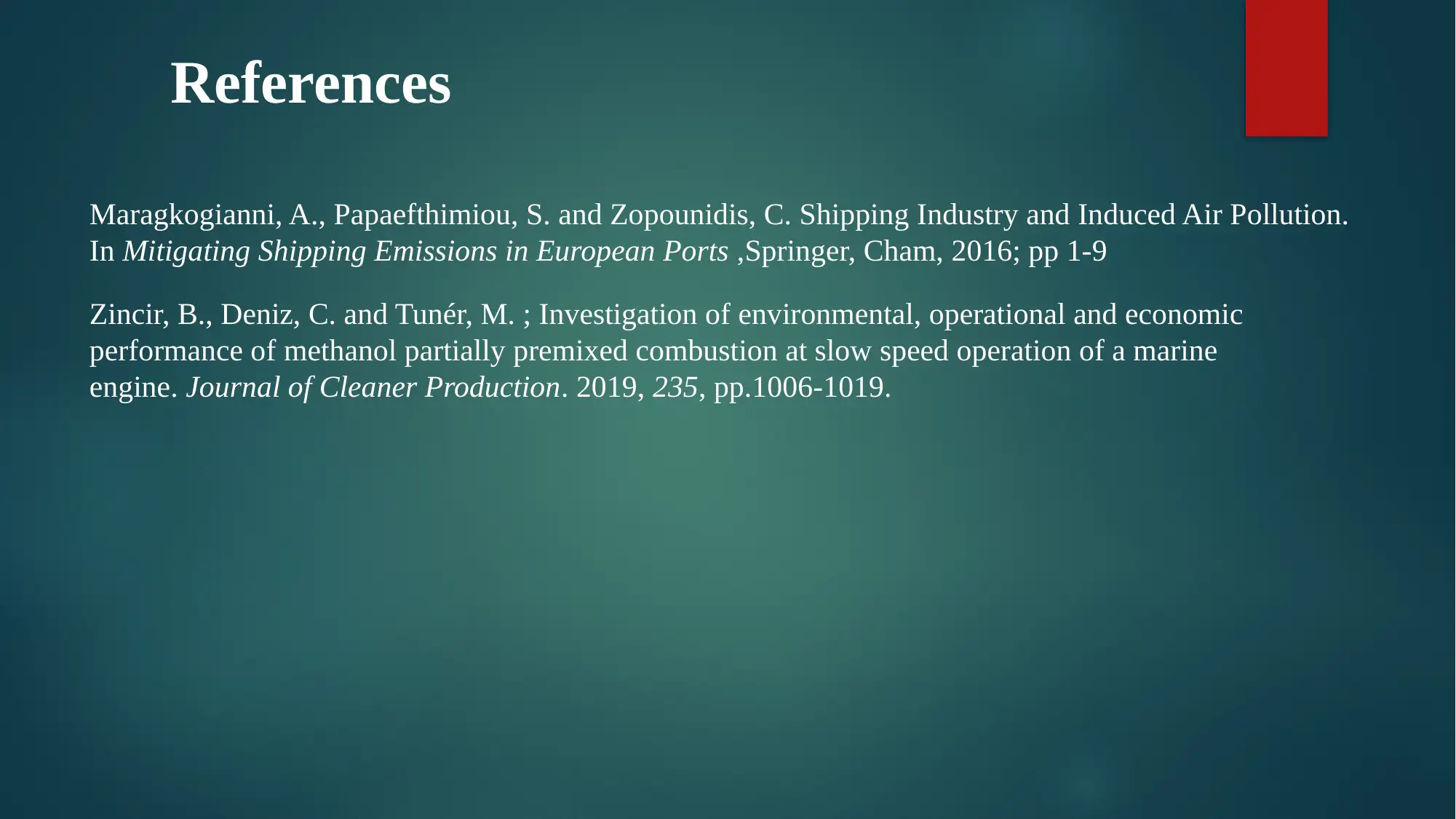
References
Maragkogianni, A., Papaefthimiou, S. and Zopounidis, C. Shipping Industry and Induced Air Pollution.
In Mitigating Shipping Emissions in European Ports ,Springer, Cham, 2016; pp 1-9
Zincir, B., Deniz, C. and Tunér, M. ; Investigation of environmental, operational and economic
performance of methanol partially premixed combustion at slow speed operation of a marine
engine. Journal of Cleaner Production. 2019, 235, pp.1006-1019.
Maragkogianni, A., Papaefthimiou, S. and Zopounidis, C. Shipping Industry and Induced Air Pollution.
In Mitigating Shipping Emissions in European Ports ,Springer, Cham, 2016; pp 1-9
Zincir, B., Deniz, C. and Tunér, M. ; Investigation of environmental, operational and economic
performance of methanol partially premixed combustion at slow speed operation of a marine
engine. Journal of Cleaner Production. 2019, 235, pp.1006-1019.

⊘ This is a preview!⊘
Do you want full access?
Subscribe today to unlock all pages.

Trusted by 1+ million students worldwide
1 out of 12
Related Documents
Your All-in-One AI-Powered Toolkit for Academic Success.
+13062052269
info@desklib.com
Available 24*7 on WhatsApp / Email
![[object Object]](/_next/static/media/star-bottom.7253800d.svg)
Unlock your academic potential
Copyright © 2020–2025 A2Z Services. All Rights Reserved. Developed and managed by ZUCOL.





